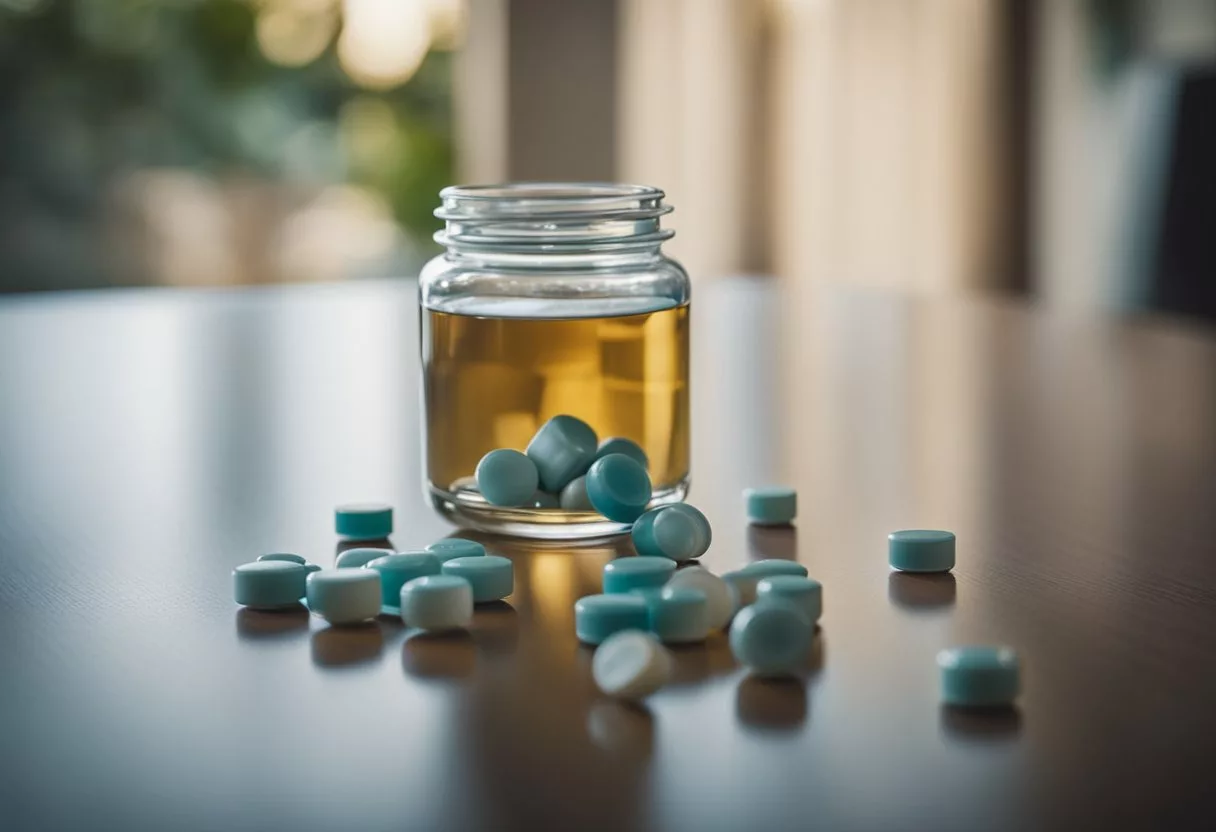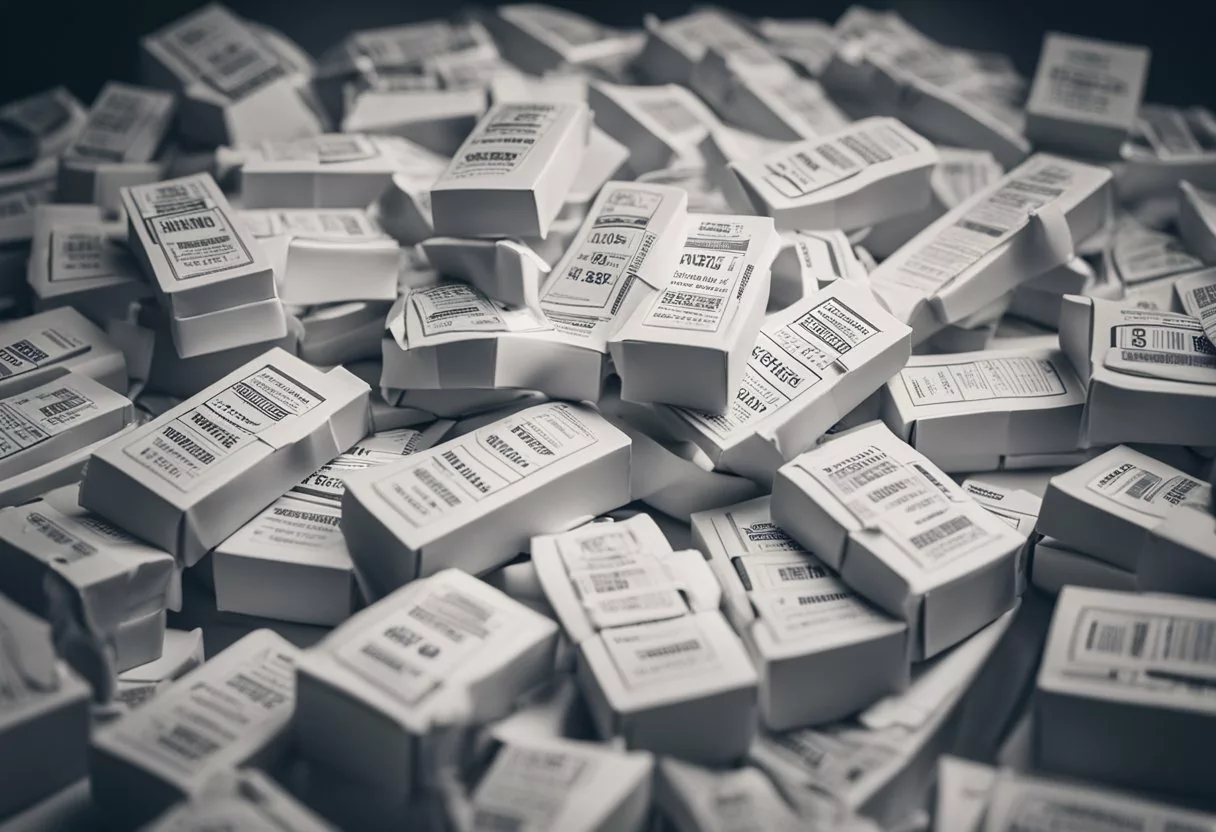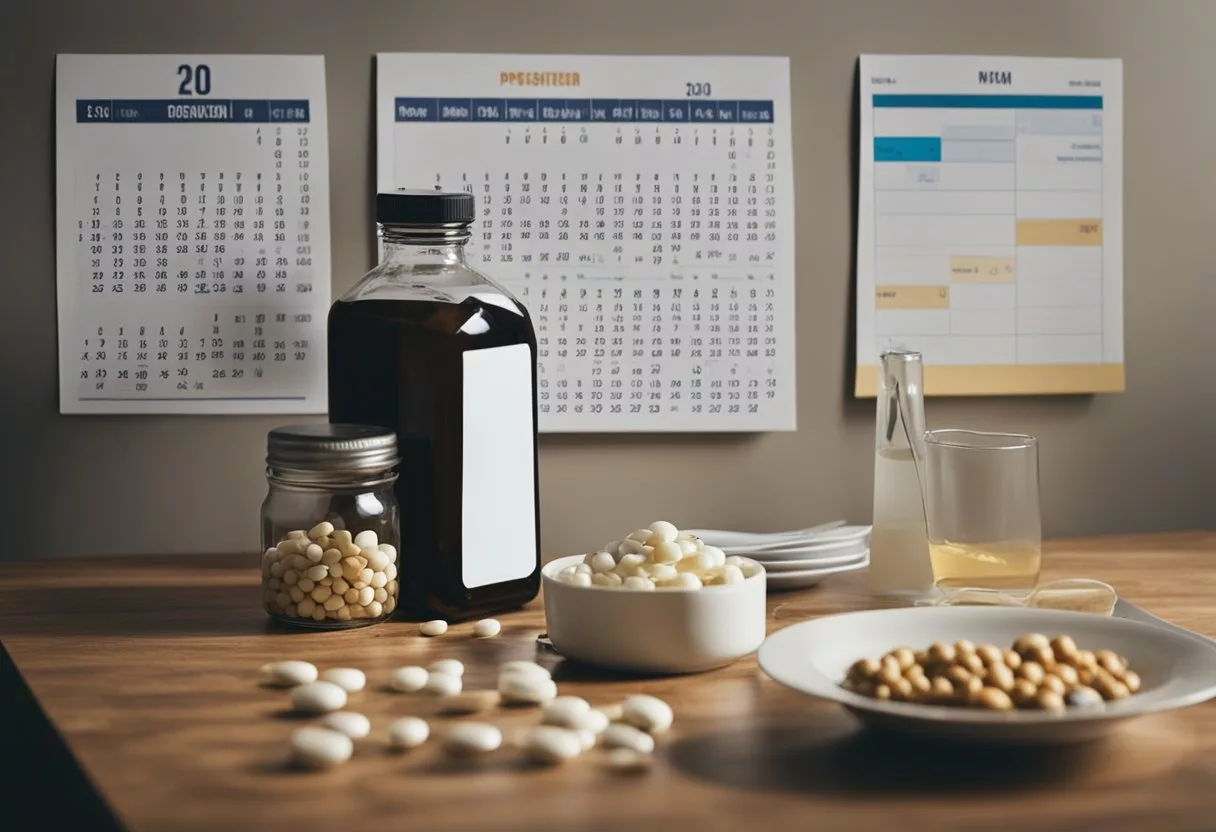Laxatives can help with occasional constipation, but taking too many can be harmful. Your body relies on a delicate balance of water, electrolytes, and nutrients. When you overuse laxatives, this balance gets thrown off.

Excessive laxative use can lead to dehydration, electrolyte imbalances, and chronic constipation. These problems can affect your heart, kidneys, and other organs. Some people mistakenly use laxatives for weight loss, but this is dangerous and ineffective.
Long-term laxative abuse can cause serious health issues. Your bowels may become dependent on laxatives to function. This can lead to ongoing digestive problems and increase your risk of certain cancers. It’s important to use laxatives only as directed by a doctor.
Key Takeaways
- Overusing laxatives disrupts the body’s water and electrolyte balance
- Long-term laxative abuse can cause chronic constipation and organ damage
- Laxatives should only be used as directed by a healthcare professional
Understanding Laxatives

Laxatives are medications used to relieve constipation and promote bowel movements. They come in different types and work through various mechanisms to help ease digestive discomfort.
Types of Laxatives
There are several kinds of laxatives available. Bulk-forming laxatives add fiber to stools, making them easier to pass. Osmotic laxatives draw water into the intestines to soften stools. Stimulant laxatives trigger intestinal contractions.
Lubricant laxatives coat the intestines to help stool slide through more easily. Saline laxatives work by pulling water into the colon. Stool softeners increase water content in stools to make them softer.
Most laxatives are available over-the-counter, but some stronger ones need a prescription. Fiber supplements are a gentler option that can help regulate bowel movements naturally.
How Laxatives Work
Laxatives affect the digestive system in different ways. Bulk-forming and fiber supplements absorb water to create larger, softer stools. Osmotic and saline laxatives pull water into the intestines.
Stimulant laxatives increase muscle contractions in the intestines. This speeds up how fast waste moves through. Lubricant laxatives coat the intestinal walls and stool surface to ease passage.
Stool softeners let more water mix into stools. This makes them softer and easier to pass. The type of laxative used depends on the cause and severity of constipation.
Appropriate Use of Laxatives
Laxatives should be used carefully and only when needed. For occasional constipation, try lifestyle changes first. Eat more fiber, drink more water, and exercise regularly.
If constipation persists, start with gentler options like fiber supplements or osmotic laxatives. Use the lowest dose that works. Don’t use stimulant laxatives for more than a week without talking to a doctor.
Long-term laxative use can be harmful. It may lead to dependency, electrolyte imbalances, or other health issues. Always follow package directions or your doctor’s advice. Stop use and seek medical help if you have severe stomach pain, cramping, or bloody stools.
Short-Term Effects of Laxative Overuse

Taking too many laxatives can cause several immediate health problems. These issues can range from uncomfortable to potentially dangerous. Let’s look at the main short-term effects of using laxatives excessively.
Dehydration and Fluid Loss
Excessive laxative use can lead to dehydration. Laxatives work by drawing water into the intestines. This can cause the body to lose more fluids than normal.
Signs of dehydration include:
- Thirst
- Dry mouth
- Dark urine
- Dizziness
- Fatigue
Severe dehydration may require medical treatment. It’s crucial to drink plenty of water when using laxatives.
Diarrhea and Its Complications
Overusing laxatives often results in diarrhea. This can be more than just uncomfortable. Frequent diarrhea can cause:
- Skin irritation around the anus
- Weakness and fatigue
- Further dehydration
In some cases, diarrhea from laxative overuse may contain blood. This is a sign to stop using laxatives and see a doctor right away.
Electrolyte Imbalance and Muscular Function
Laxatives can disrupt the body’s balance of important minerals called electrolytes. These include sodium, potassium, and magnesium.
Electrolyte imbalances can affect muscle function. This might cause:
- Muscle weakness
- Cramping
- Irregular heartbeat
In severe cases, electrolyte problems can be life-threatening. It’s important to recognize these symptoms and seek medical help if they occur.
Gastrointestinal Symptoms
Excessive laxative use can upset the digestive system. This often leads to several uncomfortable symptoms:
- Bloating and gas
- Stomach pain
- Nausea and vomiting
These issues can disrupt daily life and eating habits. They may also mask other health problems, making diagnosis difficult.
Long-term laxative overuse can make these symptoms worse over time. It can also lead to more serious digestive issues.
Long-Term Consequences

Taking too many laxatives over time can lead to serious health issues. The body may become dependent on them for bowel movements. This can cause lasting damage to important organs and systems.
Dependency and Bowel Function
Overusing laxatives can make it hard for the body to have normal bowel movements without them. The colon may lose its ability to contract properly. This leads to chronic constipation.
People may need higher doses of laxatives to get the same effect. The body becomes reliant on these medications to pass stool. This dependency can be hard to break.
Natural bowel function may take weeks or months to return after stopping laxative use. Some people may need medical help to retrain their bowels.
Chronic Health Issues
Long-term laxative abuse can cause many health problems. It may lead to dehydration and electrolyte imbalances. These affect how the body works.
Kidney damage is a serious risk. The kidneys work hard to balance fluids and minerals. Too many laxatives make this job harder.
Other issues include:
- Weak bones
- Heart problems
- Muscle weakness
- Nerve damage
Laxative overuse may even increase the risk of colon cancer. It’s important to use these medications only as directed by a doctor.
Laxative Abuse and Eating Disorders
Some people with eating disorders misuse laxatives to lose weight. This is very dangerous. It doesn’t help with weight loss and can cause severe health problems.
Laxative abuse in eating disorders can lead to:
- Malnutrition
- Severe dehydration
- Irregular heartbeats
It’s crucial for those struggling with eating disorders to get professional help. Laxative abuse can make recovery harder and cause long-term damage.
Healthcare providers can offer safe ways to manage weight and eating habits. They can also treat any health issues caused by laxative abuse.
Lifestyle and Dietary Considerations

Making smart choices about diet and daily habits can help reduce reliance on laxatives. Eating the right foods, drinking enough fluids, and staying active all play key roles in healthy digestion.
Increasing Dietary Fiber Intake
Fiber is crucial for good digestion and regular bowel movements. Adults should aim for 25-30 grams of fiber daily. High-fiber foods include:
- Whole grains like oats and brown rice
- Beans and lentils
- Fresh fruits with edible skins
- Leafy green vegetables
- Nuts and seeds
Adding fiber gradually helps prevent gas and bloating. Spreading fiber intake throughout the day, rather than all at once, can be helpful.
Bran cereals offer a concentrated source of fiber. Just a half cup can provide 10-20 grams. Prunes and figs are also fiber-rich fruits that naturally promote regularity.
Staying Hydrated
Drinking enough fluids is key for healthy digestion. Water helps soften stools and move waste through the intestines. Most adults need 8-10 cups of fluids daily.
Plain water is ideal, but other good options include:
- Herbal tea
- Low-fat milk
- Fresh fruit or vegetable juices
- Clear broths
Limiting caffeine and alcohol is wise, as these can be dehydrating. Warm liquids in the morning may help stimulate bowel movements.
Setting reminders to drink regularly throughout the day can be helpful. Keeping a water bottle handy makes it easier to stay hydrated.
Physical Activity Impact
Regular exercise supports digestive health in several ways. It stimulates intestinal muscles, helping move stool through the colon. Physical activity also reduces stress, which can contribute to constipation.
Even light exercise like a daily 30-minute walk can make a difference. Other good options include:
- Swimming
- Yoga
- Cycling
- Dancing
Exercise is most effective when done consistently. Finding enjoyable activities makes it easier to stay motivated. Gradually increasing activity levels helps prevent injury.
Timing matters too. Some find exercising shortly after waking or after meals helps promote bowel movements. Staying well-hydrated during workouts is important.
Safe Use of Laxatives
Proper laxative use requires careful attention to dosage, medical guidance, and alternative options. Following instructions and seeking professional advice can help prevent complications and ensure effectiveness.
Reading Labels and Dosage Instructions
Laxative labels contain crucial information for safe use. Always check the active ingredients and their amounts. Follow the recommended dosage based on age and health status. Do not exceed the maximum daily dose listed on the package.
Pay attention to usage warnings. Some laxatives are not safe for pregnant women or people with certain medical conditions. Look for potential side effects and drug interactions.
Instructions may vary for different types of laxatives. Osmotic laxatives[1] like polyethylene glycol require mixing with water. Stimulant laxatives often need to be taken at specific times, such as before bed.
Keep track of how long you’ve been using laxatives. Most should not be used for more than a week without medical supervision.
Consulting Healthcare Providers
Talk to a doctor or pharmacist before starting regular laxative use. They can help determine if laxatives are appropriate and which type is best for your situation.
Discuss any existing health conditions or medications you’re taking. Some laxatives may interfere with other drugs or worsen certain health issues.
If constipation persists despite laxative use, seek medical advice. Chronic laxative use can lead to dependence[2] and decreased bowel function.
Be open about your symptoms and concerns. A healthcare provider can check for underlying causes of constipation and suggest tailored treatment plans.
Alternatives and Adjunct Therapies
Consider natural alternatives before turning to laxatives. Increase fiber intake through fruits, vegetables, and whole grains. Aim for 25-30 grams of fiber daily.
Stay hydrated by drinking plenty of water. This helps soften stool and promote regular bowel movements.
Regular exercise can stimulate digestive function. Even light activities like walking can help.
Try over-the-counter fiber supplements as a gentler option. These can be used more safely for longer periods than stimulant laxatives.
Probiotics may improve gut health and regularity. Look for products with live cultures in yogurt or supplements.
Lifestyle changes often work best when combined. A mix of diet, exercise, and hydration can reduce reliance on laxatives.
Recognizing and Handling Overdose

Taking too many laxatives can lead to serious health issues. Knowing the signs and how to respond is crucial for safety.
Symptoms of Laxative Overdose
Symptoms of laxat[3]ive overdose[3] include:
- Severe diarrhea
- Dehydration
- Electrolyte imbalance
- Abdominal pain and cramping
- Nausea and vomiting
- Weakness and dizziness
- Rapid heartbeat
In extreme cases, a person may experience:
- Fainting
- Muscle spasms
- Confusion or disorientation
These signs can appear quickly or develop over time, depending on the amount and type of laxatives taken.
Immediate Steps and Treatment
If someone has taken too many laxatives:
- Stop using laxatives immediately.
- Drink plenty of water to replace lost fluids.
- Eat foods rich in electrolytes like bananas and spinach.
- Rest and avoid strenuous activity.
For mild cases, these steps may be enough. However, severe symptoms require professional help.
When to Seek Medical Attention
Call for emergency help[4] if the person shows:
- Signs of severe dehydration
- Bloody stools
- Intense abdominal pain
- Irregular heartbeat
- Difficulty breathing
- Seizures or loss of consciousness
Medical treatment may involve:
- IV fluids for rehydration
- Electrolyte replacement therapy
- Monitoring of vital signs
- Treatment of complications
Prompt medical care can prevent serious health problems from laxative overdose.
Special Considerations

Certain groups need extra care when using laxatives. Pregnant women, nursing mothers, children, and older adults face unique risks and should use caution.
Laxatives in Pregnancy and Breastfeeding
Pregnant women should be careful with laxative use. Some types may be safe, but others can harm the baby. Bulk-forming laxatives are often the safest choice during pregnancy.
Doctors may suggest these first. Stimulant laxatives can cause contractions and should be avoided. Breastfeeding moms need to be careful too. Some laxatives can pass into breast milk.
This may affect the baby’s digestion. Always talk to a doctor before using any laxatives while pregnant or nursing. They can suggest safe options and proper doses.
Laxatives for Children and the Elderly
Children and older adults need special care with laxatives. For kids, dietary changes[2] are often the first step. More fiber and water can help. If laxatives are needed, the dose must be right for the child’s age and size.
Older adults may be more sensitive to laxatives. They can get dehydrated easily. Stimulant laxatives can be harsh for seniors. Gentler options like stool softeners may be better.
Both groups should avoid long-term laxative use. It can lead to dependence. Always check with a doctor first. They can suggest safe options and watch for side effects.
Frequently Asked Questions

Laxative overdose can cause serious health issues. Knowing the signs and proper steps to take is crucial for safety.
What are the signs and symptoms of laxative overdose?
Excessive laxative use can lead to diarrhea, dehydration, and electrolyte imbalance. Other symptoms include stomach cramps, weakness, and dizziness.
Severe cases may cause heart problems or kidney damage.
Can taking too many laxatives be fatal?
In extreme cases, laxative overdose can be life-threatening. Severe dehydration and electrolyte imbalances can lead to heart arrhythmias or organ failure.
Seek immediate medical help if you suspect a laxative overdose.
How can you treat symptoms of an overdose at home?
Drink plenty of water to combat dehydration. Eat foods rich in electrolytes like bananas and yogurt.
Rest and avoid physical activity until symptoms improve.
What immediate steps should you take if you’ve taken a high dose of laxatives?
Call poison control or seek emergency medical care right away. Do not try to induce vomiting unless told to do so by a medical professional.
Bring the laxative package with you to the hospital if possible.
Is there a risk associated with daily laxative use?
Daily laxative use can be harmful. It may lead to chronic constipation, bowel dependency, and nutrient deficiencies.
Only use laxatives daily under a doctor’s supervision.
How can one alleviate stomach pain after laxative overuse?
Apply a heating pad to your stomach. Drink clear fluids and eat bland foods like rice or toast.
Avoid caffeine and alcohol. Take over-the-counter pain relievers if needed.
References
- Don't bomb the bowel with laxatives. https://www.health.harvard.edu/diseases-and-conditions/dont-bomb-the-bowel-with-laxatives Accessed November 3, 2025
- Nonprescription laxatives for constipation: Use with caution. https://www.mayoclinic.org/diseases-conditions/constipation/in-depth/laxatives/art-20045906 Accessed November 3, 2025
- Access to this page has been denied. https://www.goodrx.com/conditions/substance-use-disorder/signs-symptoms-drug-overdose Accessed November 3, 2025
- What to Do if You Think Someone is Overdosing | Stop Overdose. https://www.cdc.gov/stop-overdose/response/index.html Accessed November 3, 2025
